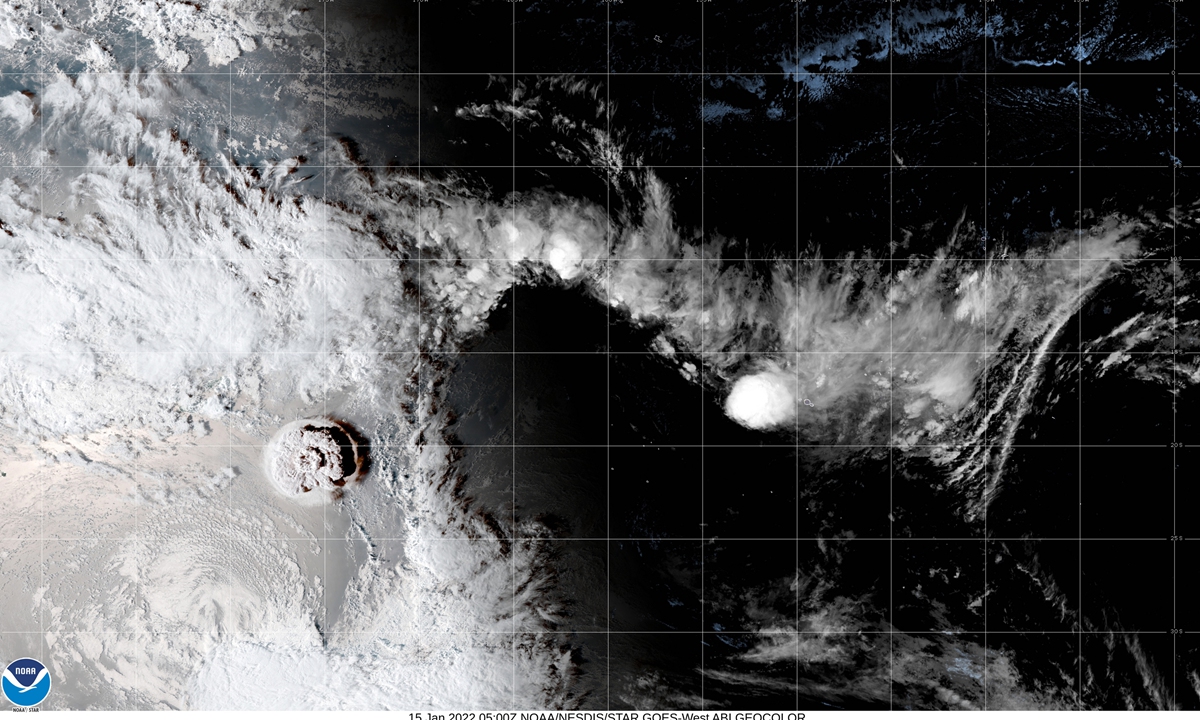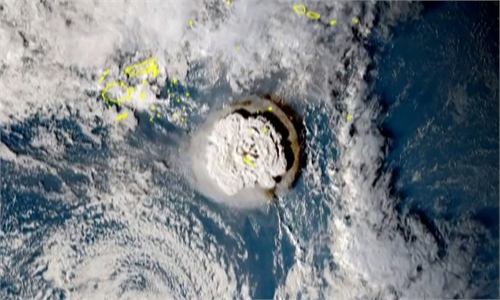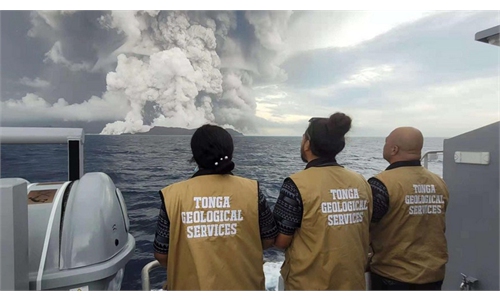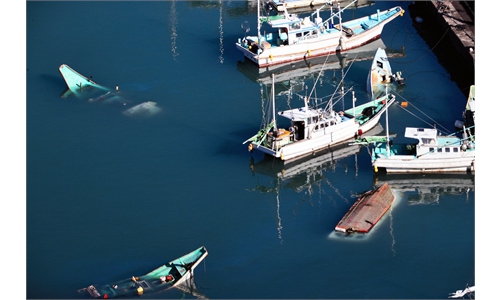China Red Cross, medical aid teams ready to help Tonga
Experts concerned about volcanic eruption’s impact on climate

A satellite image shows the eruption of the Hunga Tonga-Hunga Ha?apai volcano located 40 miles north of Tonga’s main island on January 15. Photo: CFP
The Red Cross Society of China has decided to provide $100,000 in cash to Tonga, a South Pacific country that suffered from a devastating tsunami triggered by a massive underwater volcanic eruption, according to the Chinese Foreign Ministry on Monday.
Chinese Foreign Ministry spokesperson Zhao Lijian disclosed the information during a routine press conference on Monday, while sending deep sympathy and sincere condolences to Tonga.
Zhao said that China will offer further help within its capability to Tonga based on the latter's needs and the disaster situations, and China believes that the government of Tonga and its people could overcome the disaster soon and rebuild their beautiful home.
Zhao's remarks came after Tonga's call for "immediate assistance" to provide its people with fresh drinking water and food, read a statement released by Lord Fakafanua, speaker of the legislative assembly of Tonga, earlier on Monday, as the world sent thoughts and prayers to the South Pacific country after a devastating tsunami triggered by an unprecedented underwater volcanic eruption on Saturday.
The Tonga House Speaker said in the statement that "communications remain down and the full extent of the harm to lives and property is currently unknown."
Xu Wei, spokesperson with the China International Development Cooperation Agency, said that China is willing to provide humanitarian aid to Tonga and stands ready to offer helps in the post-disaster rebuilding.
Yu Lei, chief research fellow at the research center for Pacific island countries of Liaocheng University in East China's Shandong Province, told the Global Times due to the safety of maritime transportation, the outside world might need to ship medicine, food and drinking water to Fiji first by air and then use smaller aircraft to transfer them to Tonga.
Tan Xiuling, the leader of second batch of Chinese medical aid teams to Tonga who worked in the Pacific island country in 2019, told the Global Times on Monday that the fifth batch of medical teams has immediately voiced willingness to support and participate in post-disaster medical work in Tonga, to provide services to local residents and Chinese nationals.
According to Tan,the Chinese team would normally consist of six members and the time of their arrival would be determined by consultations with Tonga authorities.
Tan predicted that due to the depth of the island and the dispersal of the local residents, people are likely to have enough time to evacuate and avoid direct damage from the disaster.
Zhang Xuanbo, a staffer with the Chinese Embassy in Tonga, revealed that around 5 pm on Monday, there were around 1,000 Chinese nationals and six China-backed firms in Tonga, and so far there was no report of deaths to Chinese nationals in Tongatapu, the main and largest island of the country, but some suffered minor injuries.
The Chinese embassy staffer said that the international communication and internet service on Tongatapu is still off. Domestic phone services are back but remain affected.
The embassy is still investigating the situations in the outer islands where communication is completely cut off.
Liang Qing, staff in charge of the South Pacific branch of China Civil Engineering Construction Corporation (CCECC), said that their staffers in Tonga are not in danger, and their necessities are good for three to six months, CCTV reported on Monday.
Chinese embassies in countries near Tonga such as New Zealand, Fiji and Solomon Islands reached by the Global Times on Monday said that they have not received reports of deaths or injuries of Chinese nationals from the disaster.
Reuters on Monday reported that ash was also posing a major health concern, contaminating drinking water.
Tonga's drinking water mainly relies on gathering rainfall. When pollutants that come with the eruption such as the sulfur dioxide entering the air, the rainwater will be undrinkable, Yang Honglian, a Fiji-based senior expert in Southern Pacific nations, told the Global Times on Monday, while noting that in the following stage, donations of drinking water and food would be crucial for Tonga people.
Li Junsheng, a research fellow at the Chinese Academy of Environmental Sciences, told the Global Times on Monday that "In theory, the tsunami can destroy the freshwater sources, which are close to the sea. The volcanic ash in the air not only pollutes the rain, but can drop with the rain to the ground to contaminate the freshwater sources."
Officially named the Kingdom of Tonga, the South Pacific island country is an archipelago of 169 islands, of which 36 are inhabited. It has a population of 105,000.
The undersea Hunga Tonga-Hunga Ha'apai volcano, located some 64 kilometers north of Tongan capital Nuku'alofa, erupted violently on Saturday, triggering tsunami warnings across the South Pacific and the US west coast, and causing strong waves and currents in many coastal areas, the New York Times reported.
An expert from the National Meteorological Center told the Global Times on condition of anonymity that the eruption was one of the strongest in 30 years, which could affect the global climate.
The eruption will influence the trend of La Nina through the interaction between the atmosphere and the ocean. The ash has begun to spread westward, which raised people's alert to the associated extreme weather such as heavy rain, the expert said. Volcanic ash can also produce acid rain.
In the short term, the eruption could cause a slight temperature reduction. But greenhouse gas emissions may exacerbate climate change, Ma Jun, director of the Beijing-based Institute of Public and Environmental Affairs, told the Global Times on Monday.
Ma noted that Tonga sits in a sea region that has a key effect for El Ni?o and La Nina, which count as causes of extreme weather in China in the past years.
However, Ma said that since Tonga is far away from China, considering ocean currents, the polluted contaminated water would hardly reach the coast of China.
Tao Mingyang also contributed to the story





